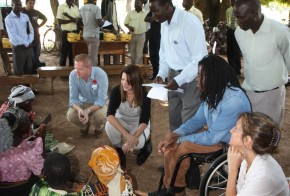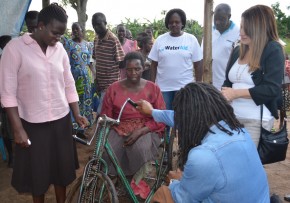In August I met Lynne Featherstone and she told me about the work DFID is doing to raise the profile of disability rights in international development.
Back in 2000 the UN’s Millennium Development Goals set out how they were going to change the world to meet the needs of the poorest over the next 15 years. Surprisingly, the goals didn’t include anything on disability despite poverty being disproportionately high amongst disabled people.
Thirteen years later, disability is still largely ignored within the international development sector. But as the MDGs expire and new framework is considered, we have an opportunity to bring about change. That is why today, the International Day for People with Disabilities is so important, to help raise awareness of the issues that affect 15% of the global population.
Lynne recently lobbied the UN to add disability rights to the framework that replaces the MDGs. There are positive signs that the UN is serious about strengthening inclusion for people with disabilities in all aspects of development work. But there is still some way to go, so Lynne asked me to help her with her work.
With so many people affected I felt it was really important that I get involved. So Lynne and I recently flew to Uganda to see an African country leading the way on disability rights issues.

The trip was extremely inspirational. There are 5 million disabled people in Uganda yet we heard many stories of determination and spirit to get on with life amongst the children and adults that we met.
For them the challenges to living a ‘normal’ life were great. Travelling long distances to school physically exhausted kids with weak lower limbs before they even arrived and with the school not being able to give them lunch, you begin to realise why 90% of disabled children in Africa do not get regular schooling. One parent carried his blind daughter who was blind and unable to walk, 2km to school every day because he wanted her to have a better life when she was older. Disability rates are higher among girls and women, accounting for approximately two-thirds (64%) of the world’s blind population. Disabled women and girls are twice as likely to experience gender-based violence than non-disabled girls and women.
The children we met have the ability to become Uganda’s next politicians or entrepreneurs but they were worried about their future living in a society where many people would prefer disabled people to stay at home rather than find employment.

But there is hope. At the St. Francis School for the blind in Soroti, run with help from Britain through the International Inspiration programme, children are being given the skills and opportunity they need to thrive. Water Aid, a charity supported by Britain’s own development budget, is helping to improve school facilities like an ‘inclusive toilet’ which is especially designed to ensure disabled children have the facilities they need to go to school in the first place.
What was clear is that small changes can make a big difference so people can succeed. And change can happen. Disabled people can contribute to their community and their economy. Education can help them build a better life and fight social stigma.
But social change takes time. We must do more to change attitudes and provide a lifeline to disabled people. This means leadership from the top. DFID is already incorporating disability into its programmes across Africa and Asia but others need to do the same. Action needs to happen now to make sure people with disabilities are able to become fully integrated members of all societies.
--------------------------------------------------------
Please note, this is a guest blog. Views expressed here do not necessarily represent the views of DFID or have the support of the British government.
For more details of the UK's work on disability, please read: a recent press release issued about disability in developing countries
For more details of Ade Adepitan and Lynne Featherstone's trip to Uganda please read: Uganda: Next Paralympic champions?

Recent Comments